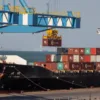South Korean anti-graft investigators are on Tuesday pushing for a new court-ordered arrest warrant for impeached President Yoon Suk Yeol, whose botched martial law bid plunged the country into its worst political crisis in decades.
The former prosecutor, who was impeached after his failed martial law decree, has resisted questioning three times over the controversial decision. Investigators are now seeking an extension to the initial arrest warrant, which expired on Monday, from the same Seoul court that issued the original order.
As they pursue the new warrant, Yoon remains in his residence, heavily guarded by hundreds of security personnel preventing his arrest. “The Joint Investigation Headquarters has refiled a warrant with the Seoul Western District Court to extend the arrest warrant for defendant Yoon,” the Corruption Investigation Office (CIO) announced late Monday. “Details regarding the validity period cannot be disclosed,” it added.
If the warrant is approved and Yoon is arrested, he would become the first sitting president in South Korean history to face detention. Investigators and the Seoul court have yet to comment on whether the warrant extension will be granted by Tuesday afternoon.
However, CIO deputy director Lee Jae-seung expressed confidence that the chances of the court rejecting the extension are “very low.” Yoon is under investigation for charges of insurrection, and if formally arrested and convicted, he could face prison time or, in the most extreme case, the death penalty.
Yoon’s legal team has repeatedly argued that the initial warrant was “unlawful” and pledged to take further legal action. They have also contended that the CIO lacks the authority to probe insurrection, as it is not listed among the offenses the office can investigate.
Despite these objections, Yun Bok-Nam, president of Lawyers for a Democratic Society (who is not involved in the case), believes the reissued warrant has a “quite high” likelihood of being approved, though it could take longer than expected. “In the previous instance, it took nearly a day and a half,” Yun told AFP.
The CIO, a relatively new agency with fewer than 100 staff, has limited experience with arrests, let alone the gravity of arresting a sitting president. “The cooperation of the police is essential,” Yun noted, as both forces are working under the Joint Investigation Headquarters umbrella.
The opposition Democratic Party announced on Monday that it would file a legal complaint against acting President Choi Sang-mok for “dereliction of duty” after he declined to intervene in the investigation.
On January 14, South Korea’s Constitutional Court will begin Yoon’s impeachment trial, which will proceed in his absence if he does not attend. Media reports suggest that Yoon is likely to appear on the opening day, though his lawyer told AFP that his attendance has not yet been confirmed. The court has up to 180 days to decide whether to dismiss Yoon from office or restore his powers.
The investigation has faced significant challenges due to the heavy security at Yoon’s residence. The presidential security service, which refused to allow investigators access during a tense six-hour standoff on Friday, has played a central role in delaying the arrest attempt.
Despite freezing temperatures, Yoon’s supporters have camped outside his residence, but protests appeared to have dwindled by Tuesday, with the streets outside quieter as the investigation awaits further developments.
AFP


